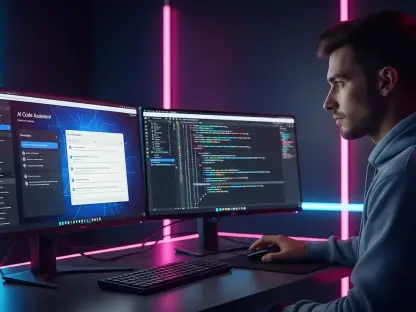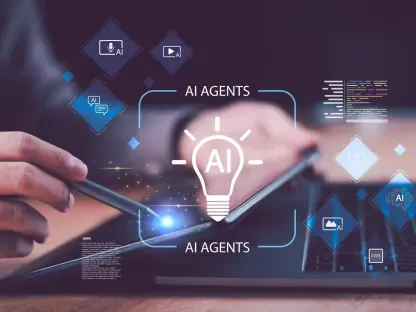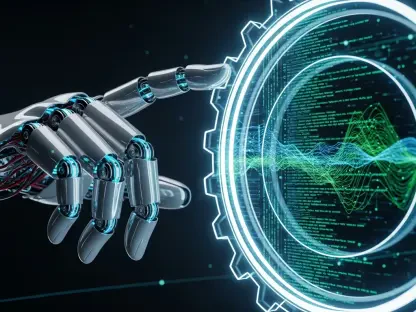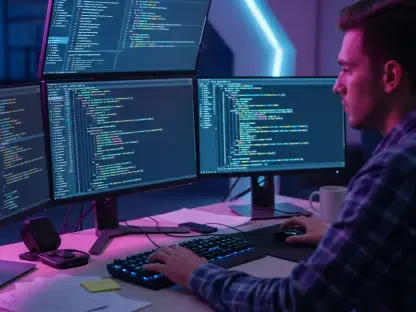In the rapidly evolving digital landscape, companies are increasingly turning to artificial intelligence to streamline operations and drive innovation. Rakuten, a leading Japanese technology company, has been at the forefront of this transformation, particularly in software development. The company’s adoption of Claude Code, an advanced AI tool, represents a significant leap forward in how technology can enhance business processes. This development is not just about technological advancement; it’s a strategic move to integrate AI into the core of Rakuten’s operations, dramatically shaping its future.
Enhancing Software Development with AI
Leveraging Claude Code for Increased Efficiency
Claude Code’s introduction into Rakuten’s development process has brought about a remarkable boost in efficiency. The tool has revolutionized the pace at which new features are brought to market. Previously, the traditional development cycle span of 24 days has been slashed to an impressive 5 days, marking a 79% improvement. This acceleration is due to Claude Code’s ability to automate coding tasks, allowing developers to focus on more complex issues that require creative problem-solving. Its ability to process vast amounts of code quickly and accurately reduces the burden on human engineers, significantly cutting time and human error.
Beyond mere speed, Claude Code provides accuracy and reliability in code generation and modification. This ensures that Rakuten maintains its high standards for quality and security in its operations. The AI tool’s capacity to autonomously manage and refactor large codebases without human intervention exemplifies its potential to handle intricate tasks effectively. This capability is particularly vital in maintaining a consistent output without compromising the integrity of the software, a crucial factor in securing Rakuten’s reputation as a reliable technology provider.
Autonomous Coding and Workflow Integration
The successful deployment of Claude Code in managing a massive open-source project demonstrated its autonomous coding prowess. During a seven-hour coding marathon, it refactored a large codebase with exceptional accuracy, standing as a testament to its reliability in handling labor-intensive tasks independently. This ability to function autonomously is revolutionizing the software development process by allowing human engineers to allocate their expertise towards more strategic pursuits, driving innovation and creativity.
Rakuten has strategically integrated Claude Code into its existing workflows, going beyond mere automation. By reimagining these workflows, the company has facilitated more efficient parallel development processes and instant code reviews. This shift has not only enhanced team collaboration but also democratized access to software development, enabling employees from diverse backgrounds to contribute to projects. This inclusive approach expands the pool of innovation by allowing non-engineers to participate in technical tasks, encouraging a broader spectrum of ideas and solutions that can be harnessed in development initiatives.
Broader Implications for Rakuten and the Industry
Cultural Shifts and Strategic Alignment
The shift towards an AI-centric development environment is part of Rakuten’s overarching “AI-nization” strategy, reflecting a broader cultural and strategic shift within the organization. This approach aligns with the company’s mission to integrate artificial intelligence deeply into its business operations, fostering a culture of rapid innovation and responsiveness. By embedding AI into their strategic framework, Rakuten is not only optimizing efficiency but also transforming the way its teams collaborate and achieve their objectives.
This strategy represents a significant cultural evolution, shifting focus from traditional development methods to an AI-enhanced process. The democratization of development capabilities within the company encourages wider participation, breaking down conventional barriers to entry in software development. It nurtures an environment where every employee has the potential to contribute to technological advancements, fostering a diversified approach to creativity and problem-solving. Such initiatives position Rakuten as a forward-thinking company ready to tackle future challenges with resilience and adaptability.
Industry Consensus on AI Integration
Rakuten’s adoption of Claude Code reflects a growing trend in industries worldwide where AI is seen not just as a tool for efficiency but as an integral partner in operations. There is a consensus that AI should serve to augment, not replace, human intelligence. Rakuten exemplifies this by leveraging AI to amplify creativity and productivity while ensuring that human insight and judgment remain at the forefront. This approach allows companies to transcend traditional productivity barriers, offering the potential for unprecedented growth and innovation by maximizing the synergy between human capabilities and AI technology.
The collaboration with Anthropic, developers of Claude Code, highlights a commitment to responsible and ethical AI application. This partnership underlines Rakuten’s dedication to aligning technological advancement with corporate values such as transparency and integrity. By doing so, Rakuten sets a standard for others in the industry, promoting the adoption of AI as a means to drive progress while maintaining ethical considerations. This aligns with the broader industry viewpoint that responsible AI deployment can lead to sustainable long-term benefits across sectors.
Claude Code’s Impact on Development Paradigms
Strategic Implementation and Adaptation
The implementation of Claude Code within Rakuten underscores a shift in development paradigms, combining speed, accuracy, and accessibility. By drastically reducing development timelines, the company can respond to market demands swiftly and effectively, ensuring a competitive edge. This agility is crucial in today’s rapidly changing digital markets, where the ability to pivot quickly in response to consumer needs can determine a company’s success or failure.
Moreover, Claude Code’s implementation exemplifies adapting existing structures to integrate new technologies seamlessly. Rakuten’s strategic use of AI as a democratizing force in development enables a more inclusive approach to innovation, inviting participation from a broad range of stakeholders. This democratization is not only about empowering Rakuten’s workforce but also about setting a precedent for the rest of the industry, highlighting how AI tools can reshape traditional models and open up new avenues for participation and creativity.
Broadening Development Participation
One of the most transformative aspects of Claude Code is its ability to broaden participation in development beyond traditional engineering roles. By providing an accessible interface that non-engineers can use, Rakuten democratizes the creation process, allowing employees from various departments to contribute ideas and solutions. This inclusive approach to development encourages diverse perspectives, fostering innovation and crafting solutions that are more reflective of a wider array of consumer needs.
The broadening of participation in development signals a shift towards a more holistic and integrated approach to technology creation. Rakuten’s success in implementing such a strategy showcases its potential to revolutionize how companies can harness talent across all levels of their organization for technological advancement. This approach not only leads to more robust and creative solutions but also enhances employee engagement, ensuring that everyone feels part of the innovation journey.
Future Directions and Considerations
Forging Ahead with AI Innovations
Rakuten’s journey with Claude Code exemplifies how AI can fundamentally alter business operations by fostering innovation and inclusivity. This evolution is not solely about technological prowess; it’s about repositioning AI from being a supportive tool to becoming a transformative force that actively shapes business strategy. As Rakuten continues to refine and expand its AI-driven initiatives, there are several considerations for the future.
To truly harness the transformative power of AI, Rakuten and similar companies must continue cultivating environments that encourage experimentation, learning, and adaptation. A critical aspect of moving forward will be ensuring that all innovations align with ethical standards and contribute to sustainable business practices. By upholding these principles, organizations can avoid potential pitfalls and enhance the positive impact of AI on societal and economic landscapes.
Setting the Blueprint for AI Integration
In today’s fast-paced digital world, companies are increasingly leveraging artificial intelligence to boost efficiency and foster innovation. Rakuten, a prominent Japanese technology firm, stands at the forefront of this technological shift, especially in the realm of software development. Their implementation of Claude Code, a cutting-edge AI tool, marks a pivotal advancement in utilizing technology to enhance operational processes. This evolution isn’t solely about making technological strides; it also represents a strategic initiative to embed AI deeply into Rakuten’s core functions, significantly influencing its future trajectory. By integrating AI, Rakuten seeks to not only streamline its operations but also gain a competitive edge in the technology industry. With AI’s potential to transform various business sectors, Rakuten’s move highlights its commitment to innovation and adaptability in an ever-changing market. As AI continues to evolve, Rakuten’s proactive approach ensures it remains a leader, setting benchmarks for others in the digital era.









